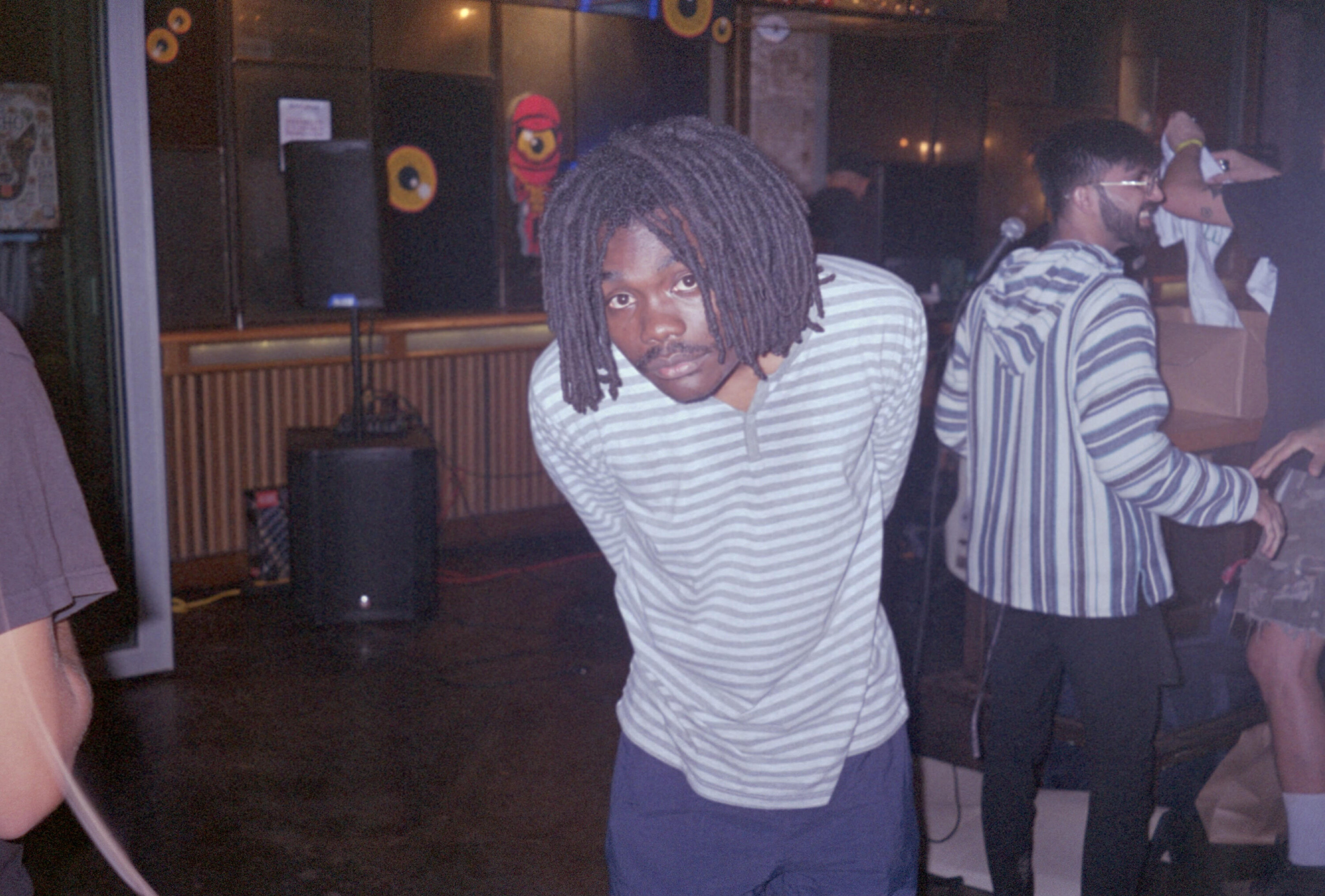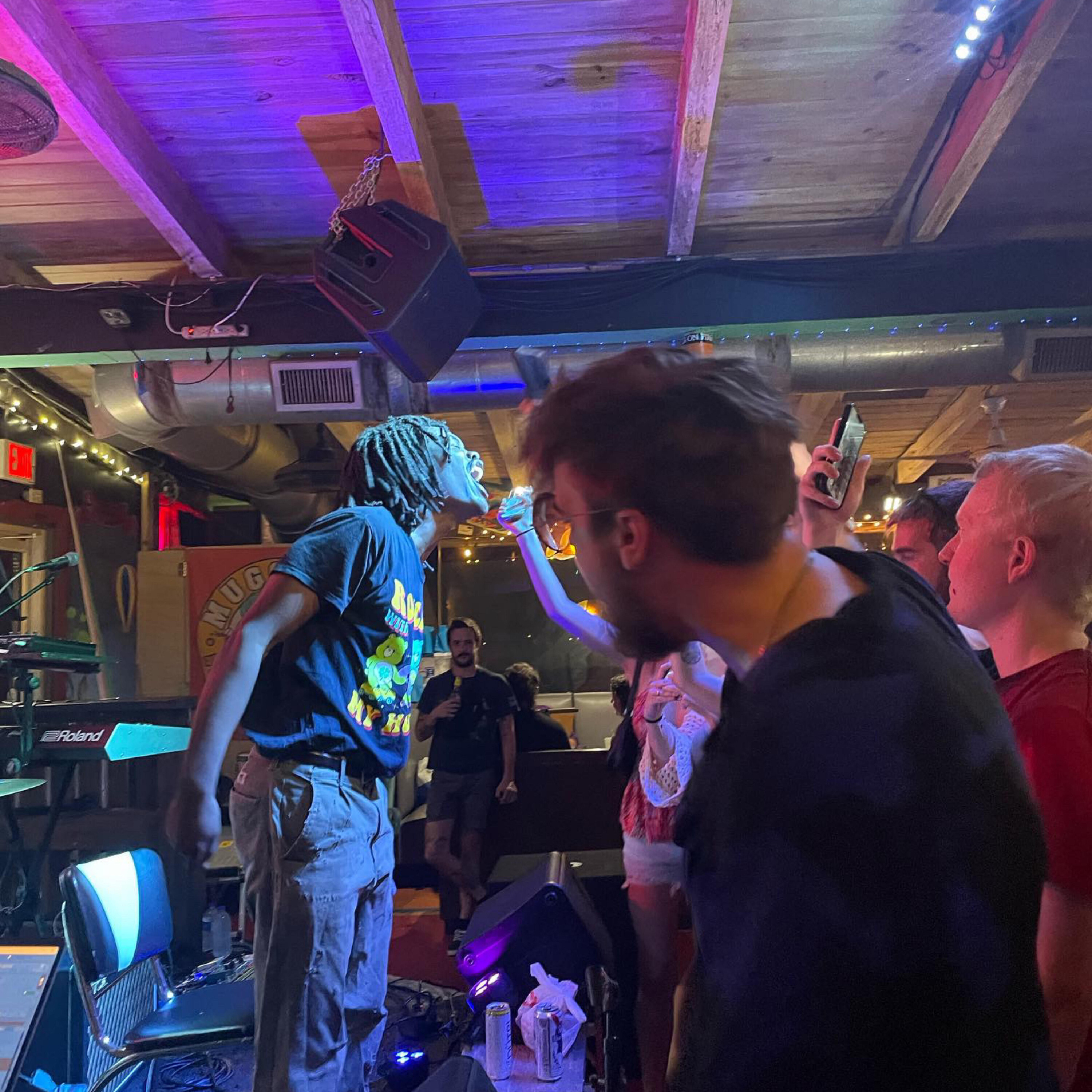Welcome to Songwriting School, where we talk to songwriters about the craft of songwriting.
Born in Pensacola, 22-year-old pop artist Luci Lind has called Jacksonville home since he was a toddler. His coining of the genre “Jax pop” is just one example of his pride in being part of the Bold City music scene, where he gathers inspiration from his musician friends to reach out and catch song ideas as if they were glowing fireflies.
Before we started recording our conversation on his songwriting smarts, Lind mentioned that he’d set a goal to release music on a more consistent basis this year. So with that in mind, it was no surprise that our conversation about songwriting also included mentions of the importance of marketing and social media in a young musician’s life. Rather than letting that discourage him from writing and releasing new music, Lind embraces the necessity as yet another creative act, striving to reach a wide following with his Twenty One Pilots and GMK-inspired pop tunes.
Ahead of Luci Lind’s show at The Walrus with rickoLus on April 19, we sat down with the Duval indie pop lord to learn about his songwriting process.

How did you first get started in music?
A while ago, probably when I was about ten, my dad bought me a guitar, and that was fun. I’ve always had a liking towards music and seeing my favorite people being artists made me say, “I want to do that too.” Growing up, everyone was always, like, talking about what we want to do when we grow up, and I was like, well, I don’t think I have the money to be a race car driver, and I don’t think I want to go to space like that. So number three was music.
Who have been some of your biggest musical influences through the years?
I pull from a bunch of different artists. My favorite rapper is GMK. He’s actually from Jacksonville. When it comes to, like, the poppy, kind of rocky vibe, I’d say I probably pull a lot from Twenty One Pilots. Plus Erica Reese and Soapbar for sure.
Love seeing local artists on any songwriters’ lists of influences.
Those are my friends. I love them. I love them so much.
What are some things you’ve learned from your musician friends about songwriting and music-making?
Actually, Erica and I recently had a conversation about marketing and the different ways you can skin that cat. I try to keep my ear or my eyes to our own ground here in Jacksonville. I kind of envy my peers in a sense. Tori Nance‘s marketing strategy and social media strategy is very strong. Like, you can’t go on TikTok without seeing Tori Nance. It’s absolutely amazing. And I was actually talking to [Bad Madonna’s Alexis] Rhode about that today, because if I go on Instagram, I can’t not see Rhode.
Most of my conversations have been around the back end of being a musician, because I can sit in my room and record all day, you know? I could write a song all day, and even though it is a very big part, I would almost argue it’s not the biggest part, because you could write a masterpiece, but if it doesn’t leave your 1200 to 1900 followers, it doesn’t expand.
Does the marketing and social media aspect of being a musician ever discourage you from writing new songs?
It doesn’t discourage me from writing music, particularly just because if I have a song that’s in my head, I want to put it out. If it does discourage me from recording it or mixing it, it’s because I’m wondering, when I’m in that process, “Do I have a marketable piece?” I want to record something that I can put out that other people will hear and say, “Hey, Luci Lind put that out, and he’s proud of it.” I wouldn’t want to put a song out just to put a song out. I’d want to put something out that I can show somebody. Like, if someone says, “Hey, what’s your most recent song?” I want to be able to play it without saying, “Ah, I don’t know how I feel about it.”
These days, what kicks off your process of writing a song?
For me in particular, it’s actually the track itself. The instruments that I’m hearing. The vibe of the instrumental. I always like to think that the beat kind of talks to me and writes a song for me. But apart from track selection, when it comes to writing a song, I try to go in with an idea of what I’m trying to say. Like, what do I want to put out to the world right now? I’ve always seen my own music as a diary in sound, just because all of my music is really just experiences that I’ve had that are told as a story.
I’ve heard that you’ve worked with other producers on the tracks. How do you find the producers and tracks for your music?
I work with other producers for the track itself, just for the instrumental. And then when it comes to mixing, mastering, and recording, I do everything myself.
So do you write lyrics first and then give them to a producer to build around? Or do they send you tracks and you write lyrics based on those tracks?
They send me tracks and I write lyrics based on that track. Or honestly, I’ll just go on YouTube and find a track that sounds nice.
What is that searching process like for you?
It’s very tedious, honestly. Just because I’m particular and I’m pretty selective when it comes to the instruments and the instrumentals that I’ll sing on. Half the time it is me laying on a couch, listening to, like, ten seconds of beats for, like, four hours and just saying, “Nope. Next. Nope. Next. Oh, I like this one. Eh. I don’t think I like it that much.” I do that for as long as I can stand myself to be sitting there listening to music.
Your song that stands out most to me, because it’s a little darker than the others, is called “Mistakes With the Bottle.” It’s a really moving song to me—my family, like so many families, has a history of alcoholism, and I’m sure anyone who has that lived experience would be moved by the lyrics and feeling of this song. Can you tell me what was on your mind when you wrote the song and what the experience of writing it was like?
I was at my aunt’s New Year’s party. I don’t particularly know the lady, but I know she’s a family friend of my aunt’s, and I remember us kind of just having a conversation. I’ll have a conversation for hours, you know, with anybody. But this particular conversation, I was really just trying to find my way out of it because she was just telling me about her life and and just how alcohol is really the only thing that she can do in her own situation right now. She was in the military, living in the middle of nowhere. She was talking about how she was kind of stuck inside of her house or at a bar.
I was writing about her, in addition to other experiences within the music scene as well—some of my peers, plus myself, having problems with alcohol. Being at a show with your peers, your people who are your friends but are on stage, you can tell, “Oh, my friend is actually really drunk right now on the stage.” But I can look at his girlfriend, who’s also really drunk, but just like, absolutely see that she’s in love.
It was a mix of those two different ideas. There were actually two different girls I was writing about, but for the sake of the song, they became one person.
Do you do that a lot? Take disparate experiences and push them together for a song?
Yeah I do. My song “Snatch My Heart” had a similar experience as well. I wrote it after seeing Erica play live for the first time. I have always been a big fan of Erica Reese, especially when I first started making music as more of a product than something I play in my room and then put on SoundCloud for everyone. I really looked up to what Erica was doing. I think she put out the “I Know Now” video and then had like a great little run after that, and I just kind of got on the peak of that wave. And to see such a performance live? It was amazing.
Before we started recording this interview, you were talking about wanting to be more consistent with putting songs out. How has that impacted your writing process?
I think about songwriting or writing a song as catching fireflies. I can sit down and force myself to write a song, but if you force, it might hurt, you know? I try to just catch the energy in its moment. I try to catch whatever energy I’m feeling, whether it’s the beat or the space I’m in. But I personally can’t really, like, sit down and just write a song. It never really works out for me if try to think of something to say. Honestly, most of the time, I’m listening to the track that I’m trying to write on, and then I just keep trying to find new lines until a line kind of sits right, if you will.

I think one of the biggest things that stands out about your music is the way that you sing. It always feels like you’re giving vocals your all, and your voice is so energizing to listen to. When you’re writing lyrics, when you’re maybe even selecting beats that you’re going to use, how do you take into account how you’re going to sing the song?
I’m usually singing the song while I’m listening to the tracks, whether it’s just finding a melody or trying to configure the lyrics and figure out if I have to space to even put all the words in. I usually just sing it. I just sing it as I would sing it as if I were in front of the microphone. I think that my brain can almost hear it. Just having the understanding of my voice, I can kind of hear in my head what I want it to sound like.
Any final songwriting secrets you’d like to share?
If I could leave you with anything, the secret to the music? All of my songs are actually really sad and dark. That’s why I call it Jax pop. Because it’s pop music. But you listen to what I’m actually saying, and it’s like, “Oh, that kid’s from Jacksonville for sure.”
Luci Lind opens for rickoLus at the Walrus on Friday, April 19 (tickets here). You can stream his music via your preferred platform here.

Song of the Day | “Empty Trainload of Sky” by Gillian Welch and David Rawlings

The Neighborhood Playlist | July 20

Jax Music Hour Playlist | July 20

UK Shoegazers Slowdive to Kick Off New Fall Tour at St. Augustine Amphitheatre

Flipturn, St. Paul & the Broken Bones Highlight this Year’s Two-Day Florida Fest in Jacksonville Beach

Song of the Day | “Coast” by Kim Deal

The Latest Collab from Dillon and Batsauce Serves Up High Quality Production with Kindred Spirit Kool Keith

Song of the Day | “Lie 95” by Bartees Strange

Newly-Released Archive Recordings of Neil Young & Crazy Horse, ‘Early Daze’ is a Crucial Document of the Group’s Prime Era
